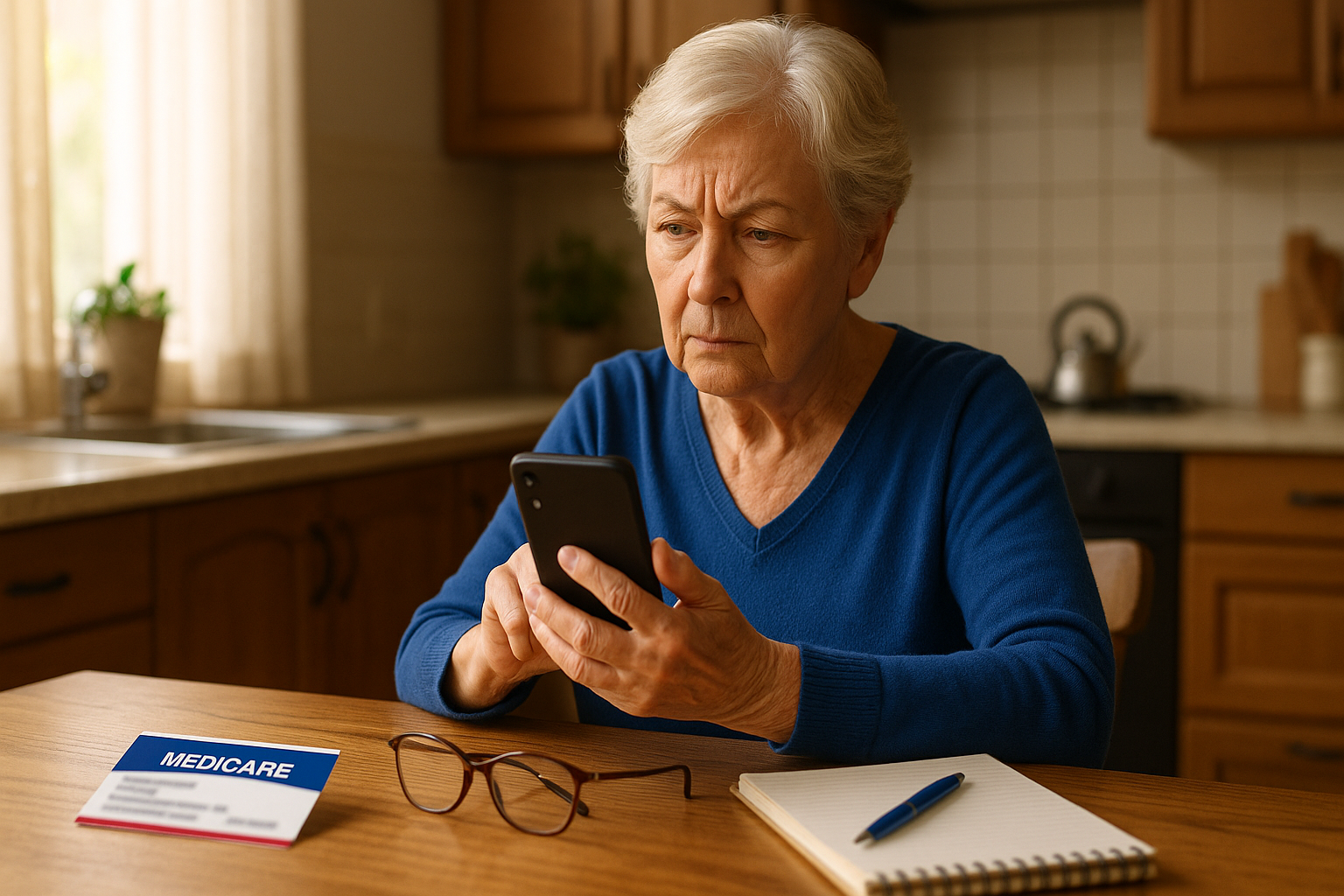.png)
Online Banking Safety for Seniors: 7 Essential Tips to Protect Your Financial Future

In today's digital world, online banking offers seniors incredible convenience – paying bills, transferring funds, and monitoring accounts from the comfort of home. Yet many older adults hesitate to embrace these tools due to legitimate security concerns. With financial scams targeting seniors at an alarming rate (over $3 billion in reported losses annually), knowing how to bank online safely isn't just convenient – it's essential for protecting your hard-earned savings.
This guide provides the fundamental safeguards every senior should know about online banking security while highlighting warning signs of common financial scams. With these basics, you can enjoy the benefits of digital banking with greater confidence and peace of mind.
In this article, you'll discover:
- Why online banking can actually be safer than traditional methods (when done right)
- 7 essential safety practices that dramatically reduce your risk of financial fraud
- How to spot the most common banking scams targeting seniors in 2025
- Simple steps to take immediately if you suspect unauthorized account activity
Want to stay informed about the latest financial security threats? Join thousands of seniors receiving our weekly Cyber Smart Newsletter with timely alerts about new scams and easy-to-follow protection tips. Sign Up Now from our Homepage - It's Free!
Why Online Banking Can Be Both Convenient and Secure for Seniors
Despite common misconceptions, online banking platforms typically employ sophisticated security measures that can make them safer than traditional banking methods. Digital transactions create electronic records that are easier to track than paper statements, allowing you to spot unauthorized activity faster. Most banks now offer instant transaction alerts, quick account freezes, and fraud monitoring systems that provide protection levels impossible with paper-based banking.
However, these protections only work when combined with smart user practices. Let's explore the essential safety measures that will help you bank online with confidence.
7 Essential Online Banking Safety Tips for Seniors
1. Create Strong, Unique Passwords
The foundation of online banking safety begins with strong password protection. Many seniors use easily guessable passwords like birthdays, anniversaries, or grandchildren's names – exactly what cybercriminals look for first.
Instead, create a password that:
- Contains at least 12 characters
- Uses a mix of uppercase letters, lowercase letters, numbers, and symbols
- Avoids personal information that others might know or find online
- Is unique to your banking accounts (never reuse passwords from other websites)
2. Enable Two-Factor Authentication
Two-factor authentication (2FA) adds a critical second layer of security beyond your password. With 2FA enabled, accessing your account requires both your password and a second verification method – typically a temporary code sent to your mobile phone.
This means that even if someone discovers your password, they still can't access your accounts without also having your personal device. Most banks now offer this feature, though the setup process varies by institution.
For step-by-step instructions on setting up two-factor authentication with screenshots for all major banks, our premium members receive access to our comprehensive "Online Banking Protection Guide" – Learn More About Membership Benefits
3. Verify Website Security Before Logging In
Before entering any sensitive information, always verify you're on the legitimate bank website by:
- Checking that the web address starts with "https://" (the "s" stands for secure)
- Looking for a padlock icon in your browser's address bar
- Never clicking links in emails that claim to be from your bank – instead, type the bank's web address directly into your browser or use their official mobile app
- Bookmarking your bank's genuine login page to avoid accidentally visiting fake sites
4. Monitor Your Accounts Regularly
One of the biggest advantages of online banking is the ability to check your accounts frequently without waiting for monthly statements. Develop a routine of reviewing your transactions several times a week to catch unauthorized activity early.
Many banks also offer customizable alerts that notify you when:
- Transactions exceed a certain dollar amount
- Your account balance falls below a specified threshold
- Any international transactions occur
- Your password or contact information changes
These notifications serve as an early warning system for potential fraud.
5. Recognize Banking Scam Warning Signs
Financial institutions follow strict protocols in their communications. Be immediately suspicious if you receive:
- Emails or texts claiming "urgent account problems" requiring immediate action
- Messages with generic greetings like "Dear Customer" instead of your name
- Communications with spelling errors or poor grammar
- Requests for your full Social Security number, account passwords, or PIN numbers
- Threats that your account will be closed if you don't act immediately
6. Secure Your Devices
The devices you use for banking need proper security measures:
- Keep your operating system and browsers updated with the latest security patches
- Install and regularly update reputable antivirus software
- Never use public or shared computers for banking
- Set up automatic screen locks on all devices
- Consider using a dedicated device just for financial activities
7. Be Cautious with Public Wi-Fi
Public Wi-Fi networks at coffee shops, libraries, and airports are convenient but notoriously insecure for banking activities. Hackers can potentially intercept data transmitted over these networks.
When banking online:
- Use your home's secure Wi-Fi network
- Consider using your mobile phone's data connection instead of public Wi-Fi
- If you must use public Wi-Fi, connect through a Virtual Private Network (VPN)
"After reading the Cyber Smart Seniors guide on mobile banking security, I discovered my accounts weren't as protected as I thought. Following their step-by-step instructions, I was able to properly secure my accounts and now feel confident managing my finances online." — Robert M., CSS Member
Common Banking Scams Targeting Seniors and How to Avoid Them
Phishing Emails and Text Messages
Phishing attempts are fraudulent communications designed to look like they're from legitimate financial institutions. These messages typically create a sense of urgency about a "problem" with your account and include links to fake websites designed to steal your login credentials.
Protection Tip: Never click links in emails claiming to be from your bank. Instead, contact your bank directly using the phone number on your card or statement.
Fake Banking Calls
Scammers may call pretending to be from your bank's security team, claiming they've detected suspicious activity on your account. They'll then ask you to verify your identity by providing account numbers, passwords, or one-time security codes.
Protection Tip: Legitimate banks will never call and ask for your full password or PIN. If you receive such a call, hang up and call your bank directly using the official number on your card.
Fraudulent Banking Apps
Not all banking apps in app stores are legitimate. Cybercriminals create convincing fake banking apps designed to steal your credentials when you attempt to log in.
Protection Tip: Only download banking apps directly from your bank's official website or verify the developer's name carefully in app stores.
Our premium members receive weekly updates on the latest banking scams with detailed examples and prevention strategies. Our comprehensive "Banking Notification Scams" guide includes real-world examples of fraudulent emails, texts, and websites to help you spot fakes instantly. Get Full Access to Our Complete Library of Security Guides
Frequently Asked Questions
Is online banking safe for seniors?
Online banking can be very safe for seniors when proper security measures are followed. In fact, the ability to monitor accounts daily can help seniors detect fraud faster than waiting for monthly paper statements.
How can I tell if a banking website is secure?
Look for "https://" at the beginning of the web address and a padlock icon in the address bar. Always verify you're on the official bank website by typing the address directly or using a saved bookmark.
What should I do if I notice an unauthorized transaction?
Contact your bank immediately using the phone number on the back of your card. Many banks limit liability if fraud is reported promptly, but this protection often depends on how quickly you notify them.
How often should I check my online banking accounts?
Ideally, review your accounts several times a week. The sooner you identify suspicious activity, the easier it is to resolve and the better protected you are from significant losses.
Protecting Your Financial Future
This article has covered the essential basics of online banking safety, but protecting your complete financial life requires more comprehensive knowledge. Financial scammers continuously develop sophisticated new tactics targeting seniors, making ongoing education your best defense.
Cyber Smart Seniors members receive exclusive access to our complete library of senior-friendly cybersecurity guides, including:
- Step-by-step walkthrough of setting up bank security features with screenshots for all major financial institutions
- Printable checklists for securing all your financial accounts
- Weekly updates on the newest scams targeting senior banking customers
- Deep-dive podcasts featuring interviews with cybersecurity and financial protection experts
Our premium content provides the detailed guidance many seniors need to confidently manage their finances online while maintaining maximum security.
This article offered fundamental protection strategies, but there's so much more to keeping your money safe in today's digital world. Join thousands of seniors who've strengthened their financial security with our comprehensive guides and weekly updates. Become a Cyber Smart Senior Today!
Remember that staying informed about evolving threats is your best protection against financial fraud. While this guide provides a solid foundation, new scams emerge regularly that target seniors specifically. Our premium membership ensures you're always one step ahead of scammers with timely alerts and comprehensive protection strategies.









.png)

